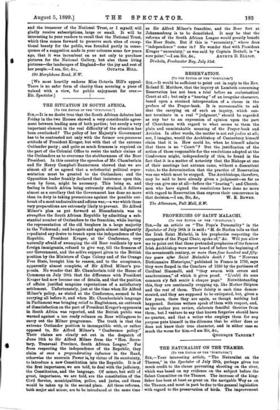RESERVATION.
[To THE EDITOR OF THE "SPECTATOR.") SIE,—It would be sufficient to point out in reply to the Rev. Roland E. Matthew, that the inquiry at Lambeth concerning Reservation has not been a trial before an ecclesiastical Court at all ; but only a "hearing " of an irregular character, based upon a strained interpretation of a clause in the preface of the Prayer-book. It is unreasonable to ask that the carrying on of such an inquiry, which can- not terminate in a real " judgment," should be regarded as any bar to an expression of opinion upon the part of Churchmen with regard to what seems to them the plain and unmistakable meaning of the Prayer-book and ArLicles. In other words, the matter is not sub judice at all; nor, I imagine, would the Archbishop of Canterbury himself claim that it is. How could he, when he himself admits that there is no " Court " ? But the justification of the action of those responsible for the resolutions adopted at the Conference might, independently of this, be found in the fact that it is a matter of notoriety that the Bishops at one of their meetings last autumn came, without a dissentient voice, to the determination that the practice of Reservation was one which must be stopped. The Archbishops, therefore, may be said to have already given a judgment—so far as they can give one at all—before the "hearing"; and Church- men who have signed the resolutions have done no more with regard to Reservation than express their concurrence in
that decision.—I am, Sir, &a., W. E. BOWEN.
The Athenzum, Pall Mall, S.W.


































 Previous page
Previous page